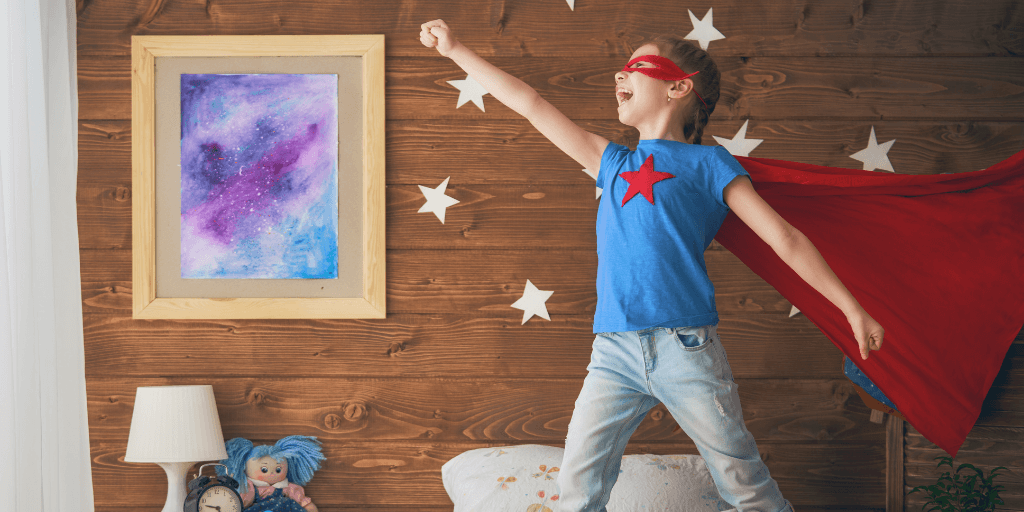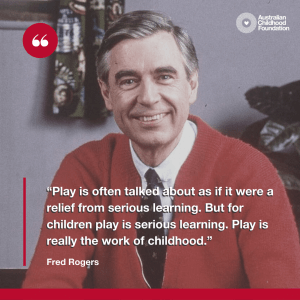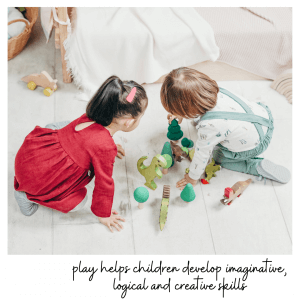
Free Play and Wellbeing
Chris Hutchinson, from the Foundation's Parenting and Early Years Program, explores the importance of free play for children and why it is essential for a child's wellbeing.
This article was written by Chris Hutchinson, Senior Consultant in the Parenting and Early Years Program at the Australian Childhood Foundation.
Play is universal, children all around the world do their own version of play. Even if play is not intentionally encouraged in a country or community somehow children still find ways to play. Through play children begin to learn and understand about themselves, other people and the world around them.
“Play is often talked about as if it were a relief from serious learning. But for children play is serious learning. Play is really the work of childhood.” – Fred Rogers
 Play provides opportunities for children to develop physical, cognitive, emotional and social skills and to develop their imagination and creativity. The quality and benefits of play are highly susceptible to the environments in which it occurs. The environment often dictates the “sense” of the play but it is important that children decide what to play, how to play, who to play with and how long to play for. Wherever children’s right to play is negatively impacted there are consequences for children’s health, development, learning and well-being.
Play provides opportunities for children to develop physical, cognitive, emotional and social skills and to develop their imagination and creativity. The quality and benefits of play are highly susceptible to the environments in which it occurs. The environment often dictates the “sense” of the play but it is important that children decide what to play, how to play, who to play with and how long to play for. Wherever children’s right to play is negatively impacted there are consequences for children’s health, development, learning and well-being.
When the play is child-initiated, children can direct the play in whatever way they like and it may provide an opportunity for children to work through any problems and issues in their lives. This is important for both children’s development and their wellbeing. With the incidence of child mental health issues on the rise, the importance of free play for children is even more crucial.
“Free play is that which is led by the child. Adults may still be involved in the play, but they are not directing the child or making the rules.”
With the availability of so many scheduled and structured activities for children; from organised sports to music or language lessons, to games and activities with rules or directions, children are not always able to just be; to choose what, with whom and how they play. Free play requires few resources; some blankets, sheets, cushions and pillows and a cubby house, fort, hiding place can be built using whatever furniture is available in the play space.
Free play and play without time constraints need to be valued as important, and balanced alongside opportunities to play with peers and nurturing adults.
“Children need the freedom and time to play. Play is not a luxury. Play is a necessity” (Kay Redfield Jamison – American clinical psychologist)
Since the onset of COVID19 and the changes created in our lives, the many scheduled play activities have not been available to children. This has opened up more opportunities for child-initiated play, this may be structured in the way of games and making things with instructions or it may be free play where children use their imagination and creativity. Maybe a pile of old clothes, shoes and bags that can be used for dress-ups will fire their imagination to be the mum going to work or the dad going shopping, to be visiting grandma or going to the beach. When children choose the play activity they enjoy a sense of freedom, joy and control and it allows them to engage in a pressure-free environment. This builds their self-esteem and gives them agency. Researcher Tassoni states that “children tend to concentrate and persevere for long periods when they are ‘in control’ of their learning. Their levels of motivation are higher because they have chosen something that appeals to them”.
 A healthy, balanced play diet will have a focus on helping a child develop imaginative, logical and creative skills. At all times during play, children should be fully immersed and finding rewards in the activity and the learning will happen automatically. If children are given many opportunities and are supported to play freely, without constraints or being lead by someone else, their wellbeing will be assured leading to better health (both physical and mental) outcomes.
A healthy, balanced play diet will have a focus on helping a child develop imaginative, logical and creative skills. At all times during play, children should be fully immersed and finding rewards in the activity and the learning will happen automatically. If children are given many opportunities and are supported to play freely, without constraints or being lead by someone else, their wellbeing will be assured leading to better health (both physical and mental) outcomes.
“The key to successful play is to find the right balance between free and structured play for your child.”
For more information on the importance of play go to:
Young children – https://raisingchildren.net.au/babies/play-learning/play-baby-development/why-play-is-important
Pre-schoolers – https://raisingchildren.net.au/preschoolers/play-learning/play-preschooler-development/why-play-is-important
School aged children – https://raisingchildren.net.au/school-age/play-media-technology/play-school-age-development/imagining-play-school-children
Another excellent article which could be recommended for further reading:
43 Ways our Kids Thrive on Free Play by Belinda Quinn from Country Buddies (bendigocb.com.au)
